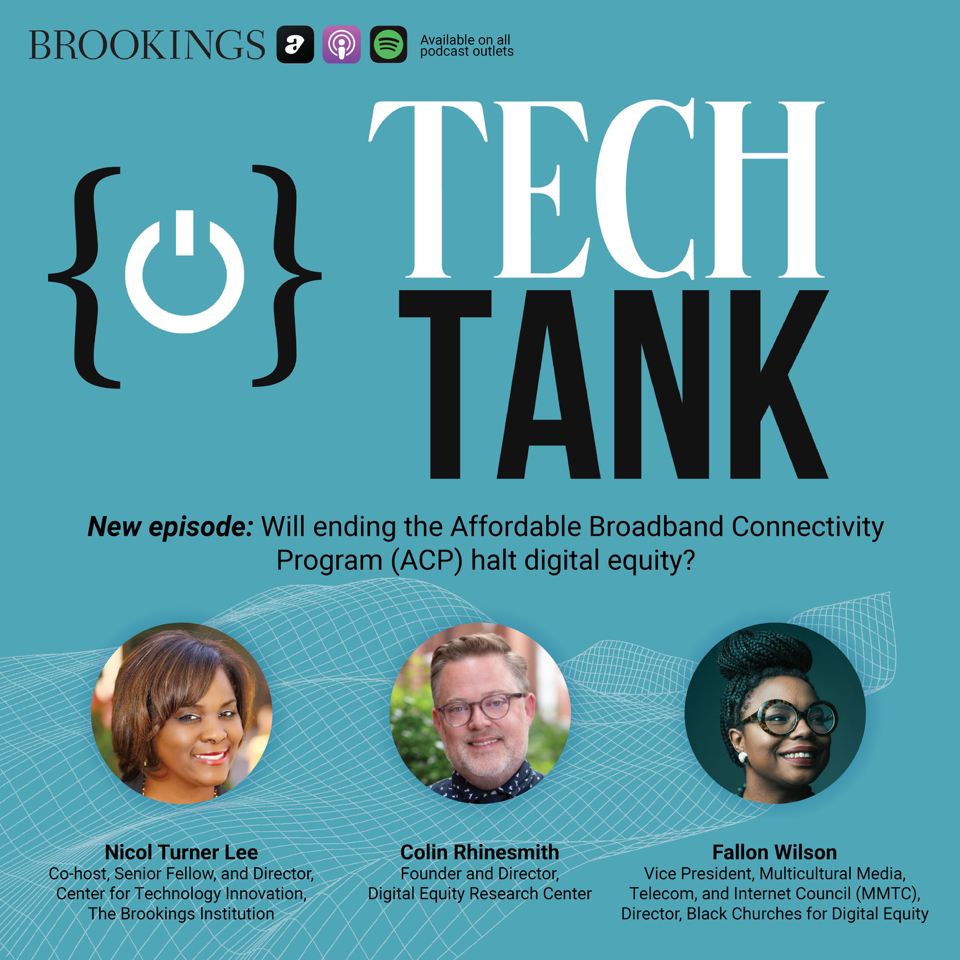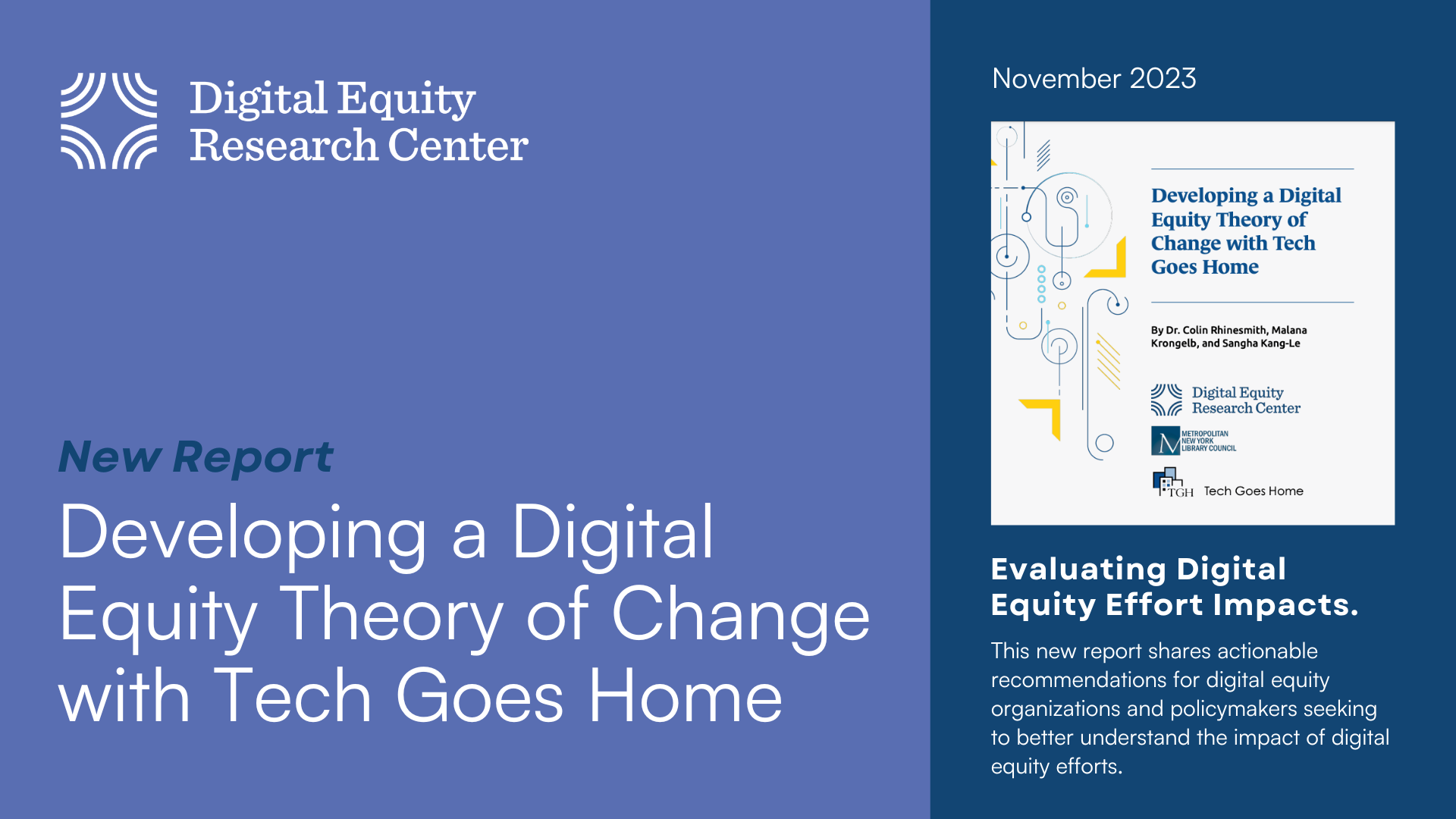It was an honor to join Dr. Nicol Turner Lee, Senior Fellow, Director of the Center for Technology Innovation at The Brookings Institution, and the host of the Brookings Tech Tank podcast, alongside Dr. Fallon Wilson, Vice President of MMTC and Director of Black Churches for Digital Equity to discuss the upcoming end of the Affordable Connectivity Program and its potential impacts on digital equity efforts nationwide.
Category Archives: Public Policy
Community Informatics and AI
 (Lego Mesh Wireless Network at the 2011 Allied Media Conference photo by Colin Rhinesmith)
(Lego Mesh Wireless Network at the 2011 Allied Media Conference photo by Colin Rhinesmith)
[Editorial re-posted from The Journal of Community Informatics]
In yesterday’s Op-Ed, titled “For all the hype in 2023, we still don’t know what AI’s long-term impact will be” written by Open University Professor John Naughton and published in The Guardian, Naughton argued that while many continue to speculate about how artificial intelligence will shape the future, “At the moment, it’s obviously impossible to say, not least because we always overestimate the short-term impacts of novel technologies while grossly underestimating their long-term effects.” Naughton went on to explain that answers might be found in three areas worthy of consideration.
The first area is AI’s role in augmenting human capability or what he described as “a new kind of ‘power steering for the mind’,” as flawed as it might be. The second is whether AI will be sustainable due to its extreme demands on natural and human resources. Third, Naughton asked “will it make economic sense?” As many critical technology scholars have underscored, magical thinking about technology must be countered by systematic analyses not only of how technology shapes society, but how society, including structural inequality, shapes technology and its consequences.
In this context, it is worth considering what the contribution of community informatics might be to further studying, analyzing, and understanding the long-term impacts of artificial intelligence.
While I hope this journal will publish more work on this topic in the years to come, I thought I’d share a couple of insights here in this editorial to get the discussion started.
In looking for inspiration to begin lightly engaging with this subject, I came across William McIver Jr.’s 2006 conference paper titled, “Community Informatics and Human Development” published in Lecture Notes in Computer Science. Following on the heels of the United Nations World Summit on the Information Society (WSIS) in Tunis in 2005 (see Gurstein’s 2005 article for more), McIver argued that “community informatics has a specific role to play in contributing to the realization of the Millennium Development goals and the improvement of human development in general.” Yet, McIver cautioned against technological deterministic thinking.
Similarly, as critical information scholars such as Safiya Umoja Noble have argued, “An app will not save us.” Rather, as Noble reminds us, artificial intelligence technologies such as a Google Search reflect “the political, social, and cultural values of society.” It is within this context that the value and possibility of community informatics can be best understood.
In 2006, McIver explained that community informatics offers a holistic process for critically studying and understanding the implementation and impacts of advanced information and communication technologies (ICTs). This process, McIver described, includes the following steps: “(1) understanding the community context to which ICTs might be applied; (2) developing appropriate and sustainable models for the socio-technical systems into which such ICTs are to be integrated; and (3) selecting and appropriating ICTs based on knowledge gained from parts (1) and (2) of this process.” Even more importantly, McIver recognized the potential threats to society from advanced ICTs such as AI because of the reasons Noble points out so comprehensively in her book.
To address these threats, McIver argued that community informatics must center democratic, participatory, and consensual processes that resist “existing power relations and inequalities,” as well as “new forms of state repression.” This is the baseline. As McIver explained, community informatics must go further.
“More fundamentally, community informatics must empower communities that contemplate ICT-based solutions to develop their own productive forces within the information society so that they can control the modes of production that evolve within it and, thereby, have the possibility of preventing and responding to its threats.”
For almost 20 years, this journal has sought to study, understand, and explain how communities have worked to achieve these goals. Community informatics continues to offer a unique space, amongst the noisy hope or hype speculations about AI, to bring communities together—through research and praxis—to investigate and contemplate the social, political, economic, and community contexts in which AI might, or might not, be applied.
My hope is that the next 20 years of this journal will provide a fourth area to Naughton’s other considerations focused on the role of communities in shaping how AI will impact our world.
New Report Highlights Participatory Action Research Project with Tech Goes Home
Over the past year, my team and I at the Digital Equity Research Center at METRO co-led a participatory action research project with Tech Goes Home (TGH). The purpose of the study was to develop a theory of change for TGH, as well as an analysis of the challenges and opportunities facing community-based organizations in conducting equity-focused program evaluations as part of their their digital equity work.
We hope the findings from our study will help to inform state and federal policymakers as the NTIA’s Internet for All grant funding rolls out over the next five years.
The Benton Institute for Broadband & Society published this summary that I co-wrote with Sangha Kang-Le (TGH) and Malana Krongelb (DERC). The article includes the following recommendations based on the findings from our participatory action research project.
For digital equity organizations, key recommendations include:
- Allocating time, money, and intentional effort to capture insights and expertise from community members;
- Engaging evaluation participants in their native languages; and,
- Working with funders to balance reporting requirements with participants’ privacy and self-defined measures of success.
Policymakers play a critical role in supporting this work and should prioritize:
- Set aside funding that organizations can use to conduct evaluation;
- Technical assistance on effective program evaluation; and,
- Allowing government funding to be used to compensate community members for their expertise.
(Image above by Becca Quon originally published on the Digital Equity Research Center website)
Digital Equity and Justice in Maryland: Challenges and Opportunities
 At the Digital Equity Research Center this year, we had the opportunity to lead a research project to gain a deeper understanding of the challenges and opportunities related to issues of digital equity and justice for residents across the state of Maryland. The study was commissioned by Economic Action Maryland. As their website explains, “Working at the local, state, and federal level, Economic Action Maryland unites individual advocates, poverty, civil rights, labor, and other public interest groups to press for policies that protect vulnerable Marylanders.”
At the Digital Equity Research Center this year, we had the opportunity to lead a research project to gain a deeper understanding of the challenges and opportunities related to issues of digital equity and justice for residents across the state of Maryland. The study was commissioned by Economic Action Maryland. As their website explains, “Working at the local, state, and federal level, Economic Action Maryland unites individual advocates, poverty, civil rights, labor, and other public interest groups to press for policies that protect vulnerable Marylanders.”
It was a privilege to be able to work with Economic Action MD to help advance their work on digital equity and justice issues for residents across the state.
Here is a bit from the Executive Summary from the report:
“This report presents findings from a study of the digital equity and justice challenges facing Maryland residents, as well as opportunities and policy recommendations to address these challenges. The research focused on gaining a deeper understanding of the landscape of issues related to providing universal broadband access and achieving digital equity and justice for all residents in Maryland during a moment of both unprecedented federal funding available to states through the Infrastructure Investment and Jobs Act and the potential for increased digital harms through both technological and market forces. The goal of this study is to inform Economic Action Maryland, and similar organizations, in their work to identify effective programs, practices, and policies that can be used to develop a digital equity policy agenda to advance justice and empower people across the state. The findings in this report are drawn from the analysis of qualitative data gathered during focus group sessions with a total of 61 participants in Baltimore City and across the state. In addition, interviews were conducted with 24 experts in Maryland and across the nation to gain their insights for the research.”
I am proud of this report, because I believe it is one of the few research studies that have sought to connect issues related to digital equity and digital justice for those most impacted by digital inequalities and those who work to support them.
Many thanks to the following individuals for their support with helping to make this research possible: Olga Akselrod, Stephanie Alphee, Jane Brown, Andrew Coy, Charlotte Davis, amalia deloney, Barbara Eucebio, Brandon Forester, Nicholas Garcia, Candace Hernandez, William Honablew, John Horrigan, Urmila Janardan, Christopher Kingsley, Leslie Margolis, Tacha Marshall, Jonathan Moore, Samantha Musgrave, Becca Quon, Chris Ritzo, Sabrina Roach, Houman Saberi, Claudia Wilson Randall, Hannah Sassaman, Marceline White, Akina Younge, Olivia Wein, and Corian Zacher.
FCC Task Force to Prevent Digital Discrimination Listening Session Comments
 The Federal Communications Commission’s Task Force to Prevent Digital Discrimination held a public listening session at Medger Evers College in Brooklyn yesterday. As part of the event, the FCC invited several speakers from a diverse group of organizations representing communities impacted by digital discrimination to provide their comments that could be included in the public record as part of the FCC’s inquiry.
The Federal Communications Commission’s Task Force to Prevent Digital Discrimination held a public listening session at Medger Evers College in Brooklyn yesterday. As part of the event, the FCC invited several speakers from a diverse group of organizations representing communities impacted by digital discrimination to provide their comments that could be included in the public record as part of the FCC’s inquiry.
As the FCC’s event page describes (and lists the speakers invited), the purpose of the listening session was to “gain additional information and understanding from affected communities, state, local, and Tribal governments, public interest advocates, and providers about challenges, barriers and experiences in ensuring all people of the United States benefit from equal access to broadband.”
Here are the remarks that I delivered along with the presentation that Becca Quon, Program Manger at the Digital Equity Research Center created for the event:
“Hello, everyone,
My name is Colin Rhinesmith, I am the Founder and Director of the Digital Equity Research Center located at the Metropolitan New York Library Council.
The Digital Equity Research Center is an applied research center that assumes digital inequality research must include analyses of historical injustice, systemic racism, and other structural inequalities in order to understand and address the root causes of the digital divide. This is one of the reasons why I am so glad the FCC is focused on understanding and defining Digital Discrimination as part of its work.
I am here today not only to share research findings from our work and others’ work to help inform the FCC in how it thinks about Digital Discrimination, but also to underscore the importance of key indicator collection and measurement data needed to advance digital equity and justice here in New York City and throughout the state.
In doing so, I want to highlight a report, titled ‘Achieving Digital Equity in New York.’ The report was published in 2021 by my colleague Lauren Moore, the Assistant Commissioner for Libraries and the State Librarian of New York.
The report identifies ‘the disproportionate access to digital resources that can be traced back to a wealth gap that has existed since 1950.’ The report goes on to say that ‘Historically, resources have gone to higher-income neighborhoods. This disproportionality continues today. Poverty and historical and structural racism are also at play; lack of or underinvestment in poor Black and brown communities such as the Bronx continues, resulting in many residents not having access to the internet at home.’
Not only should the FCC consider this history in its study of Digital Discrimination, it should also look at how the agency can help provide additional support specifically to areas of the country that have been discriminated against.
In response to this historical and technological discrimination, the FCC should help to create and support thriving digital equity ecosystems. The State Librarian’s report emphasizes that digital equity ecosystems require ‘the coordination, cooperation, and the intentional capacity-building of the many organizations supporting digital inclusion across New York.’
Towards this goal, I encourage the FCC to review findings of our report titled ‘Digital Equity Ecosystems Measurement Framework,’ which was published last year by the Metropolitan New York Library Council.
The report presents findings from a participatory research project with thirty-two digital equity and digital justice coalition leaders from across the United States, including several here in New York, who contributed their ideas to inform the framework. This work also responds to our State Librarian’s call for coordination and capacity-building by providing measurement tools to assist local coalitions in gathering data for planning, improvement, and advocacy purposes.
In its outline for collaborative change, our State Librarian’s report recommends shifting the focus of the work to address and prevent Digital Discrimination from digital equity to digital justice, stating,
‘It’s impossible to separate the root causes of digital inequity from the root causes of racism, opportunity gaps, and other systems of oppression.’
Based on these findings, which are echoed by research undertaken by our Center, I urge the FCC to move beyond using individual consumer-level indicators, such as internet speeds and quality of service measures alone in their inquiry. Rather, the FCC should undertake a more holistic community-level approach using equity indicators, such as those identified by the City University of New York’s Institute for State and Local Governance. I believe this approach to data-driven and equity-focused policymaking can assist the FCC in its efforts to combat digital discrimination while also using tools to learn about the conditions for disadvantaged groups, the disparities influencing their members, and whether those disparities are improving among specific sociodemographic communities, indicators provided by CUNY’s institute.
In closing, I applaud the FCC for leading this important work and hope the agency will see the Digital Equity Research Center as a partner in helping to create and sustain healthy digital equity ecosystems here in New York and across the country.
Thank you for listening.”

